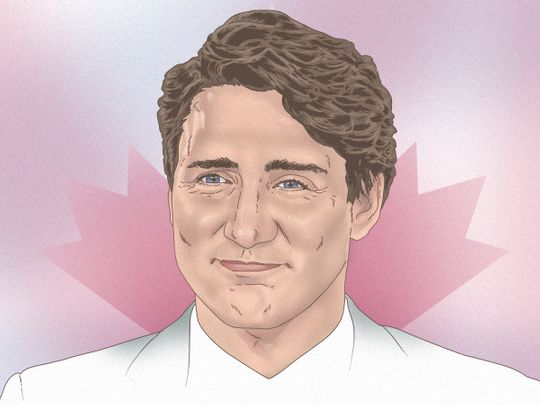
‘Nice’ is a peculiar word. It doesn’t denote anything too positive nor anything too negative. Nice to see you. Have a nice day. It’s just nice.
Canadians are nice people. Pleasant. Not offensive — just nice.
And that’s what they seem to think about Justin Trudeau. A nice chap, not offensive. And worthy of a third straight term as their Prime Minister. Not an overall majority, just a nice minority that his Liberal party can work with in Ottawa.
The Canadian capital is a pleasant city, not Montreal, not Toronto, but once a small logging town on the Ottawa River plucked from obscurity by Queen Victoria as a compromise between English and French. A nice way of solving a contentious issue.
And much of Canadian politics is like that too, finding compromise that works in the best interest of everyone. There’s a fantastic public health care system, a clean environment, few guns, true multiculturalism — easy to see why Canada is the destination of choice for so many economic migrants and refugees.
There’s little crime and it has a very positive image on the world stage. Back in the Cold War, Justin’s father, the then PM Pierre, went to Cuba and kept Canada out of Vietnam. Sure, it’s involved in Nato, came up with the idea of a UN peacekeepers and blue berets, was in Afghanistan but kept out of Iraq — and two weeks ago, when the US, the UK and Australia formed a quasi-alliance of sorts, Canadians weren’t too miffed by being left out of the deal.
It didn’t seem to hurt the younger Trudeau on the campaign trail despite the protestations from Conservative leader Erin O’Toole.
That there was an election at all was purely down to the naked political ambition of Trudeau, three years into leading a minority government and determined to use recent momentum gained by his government’s handling of the coronavirus pandemic into a majority.
It was always going to be a gamble, dissolving parliament and putting Canadians through an election campaign. As things stand now, he didn’t win. Nor did he lose. He heads into the new parliament in pretty much the same position he was before he called the vote six weeks ago. Given the possible negative consequences, it was a nice result for the Liberal leader who turns 50 in December.
The new parliament will be pretty much like the last, with Trudeau’s Liberals holding 158 seats, 12 short of the 170 needed for an outright majority and two more than they held at dissolution.
O’Toole’s Conservatives will hold 119 seats — pretty much as things stood before, and once more Trudeau will seek the support of the left-leaning New Democrats led by Jagmeet Singh, a popular politician whose orange NDP turban is now a staple of the multicultural landscape. The NDP increased its popular share of the vote to 17.7 per cent but came out of the election with 25 seats.
That disparity of voters versus seats is a result of the first-past-the-post election system used in Canada — and real electoral reform with proportional representation may be the price Trudeau will have to pay to form a stable and last government.
A vast country geographically — one parliamentary district has 45,000 voters and is the size of France — the Liberals maintained their election support in seat-rich Ontario, where roughly one-in-three of all 37 million Canadians live. Similarly, Conservative support was solid across the Western provinces of Alberta, Saskatchewan and Manitoba. And in Quebec, where outright separatist sentiments have been tempered in recent decades by pro-francophone policies, nationalist Bloc Quebecois support remains solid in rural areas, in working class districts and Quebec city.
So, another minority then for Trudeau for the next five years — unless, of course, he feels it’s worthwhile gambling once more for that Liberal majority he won at the first time of asking back in 2015.
Back then, he was a political newbie, an Instagram sensation, a darling of the media who liked his maverick and fresh approach to politics — the antithesis to a dour and humourless Stephen Harper.
Trudeau is no stranger to the ups and downs of political life. He was born on Christmas Day in 1971 in Ottawa, the eldest son of then Prime Minister Pierre Trudeau. Trudeau senior led Canada between 1968 and 1979 and again between 1980 and 1984 — an icon of public life still revered 17 years after his death. It was at his state funeral that Justin was largely introduced to the world, hugging his father’s casket and uttering the words: “Je t’aime Papa” — “I love you, Dad.”
The youthful exuberance has been blurred by bad political judgement, with the father of three embroiled in a series of scandals and missteps, blurring the line between ethics and politics with poor judgement.
And it is that poor judgement that was the focus of much of the campaign, with the opposition parties relentless in accusing Trudeau of calling an unnecessary early vote — two years before the deadline — for his own personal ambition.
If truth be told that ambition means Trudeau the younger has succeeded when his father didn’t, winning three consecutive elections. Well, maybe winning two and drawing one. Despite that hiccup, Trudeau sounded a triumphant note when he addressed the nation in the small hours of Tuesday from Montreal.
“You are sending us back to work with a clear mandate to get Canada through this pandemic and to the brighter days ahead,” he said. “And my friends, that’s exactly what we are ready to do.”
Yes, Justin. Nice try.










